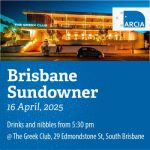Introduction to Radio Communications [Online short course]
![Introduction to Radio Communications [Online short course]](https://arcia.org.au/wp-content/uploads/2024/08/arcia-online-training-2024_intro-radio-comms-e1723001212699.jpg)
This course introduces attendees to radio communications and associated technologies.
This course introduces students to radio communication and associated technologies. Modules include an overview of radio service as a transmission media, how transmitters and receivers work, and an overview of wave propagation and radio antenna systems.
The information is introductory and designed for all audiences. Students will acquire a basic understanding of radio communications theory. This course is designed for students (individuals) who are new to the radio/critical communication industry.
Book your spot now!
What: Online short course
Date: 11-15 November 2024
Time: 10:00 am-12:00 pm (AEDT)
Duration: 5 x 2hr sessions (10hrs total)
Cost: ARCIA Member = $1240 +GST; Non-member = $1550 +GST
Trainer: Chris Stevens, CartGIS
Course Outline
Click on the topic sections to expand and see further detail of the course outline.
Introduction to Radio Communication
- What is radio communications?
- What are the use cases?
Radio Frequency
- RF fundamental operating principles and terminology
- Rules and regulations
- Licencing and ACMA
- What is propagation
- Frequency spectrum band allocations
- RF modulation and demodulation
- Coverage modelling and planning
Radio Types and Systems
- Radio technology
- Analogue systems and standards
- Digital systems and standards
- NXDN
- dPMR
- DMR (Tier 2 & 3)
- Tetra
- P25 (Phase 1 & 2)
- Radio components types
- Transmitters
- Receivers
- Amplifiers
- Radio (terminal) types
- Radio systems types
Radio Antenna Systems
- How antennas work
- Antenna types
- Antenna gain & bandwidth
- Antenna polarisation
- Antenna resonance
- Transmission lines
- Common antenna configuration
- Grounding overview
- Antenna testing
Transmission Lines and Feeders
- What are transmission lines and feeders?
- Transmission line power
- Transmission line frequency and impedance
- Connectors
- Earthing and lightning protection.
Filters and Multi-coupling
- What is multi-coupling?
- Types of multi-coupling
- Choosing the correct type
Tower and Site
- What is a radio communications site?
- Describe co-location
- Applications and licencing
- Fire suppression systems
- Site HVAC systems
- Vermin and pests
- Engineering
- Site safety
- Electromagnetic Radiation (EME)
Power Systems
- What are power systems?
- Voltage
- Polarity
- Fuses and circuit breakers
- Uninterrupted power supply (UPS) systems
- DC power systems
- AC power
- Renewable energy power systems
Earthing
- What is earthing?
- Earthing considerations
- Site earthing
- Antenna earthing
- Equipment earthing
- Standards and principles
Interference
- What is RF interference?
- Types of interference
- Interference mitigation strategies
Data Networks and Linking
- What are data networks?
- Site Links Types
- Point-to-Point
- Point-to-Multi-Point
- Mesh
- Hun and Spoke
- Radio over IP (RoIP)
- Basic fibre optic cable fundamentals and terminology
Radio Communications Testing and Equipment Maintenance
- What radio communications testing is required?
- Acceptance testing
- Factory Acceptance Testing
- Site Acceptance Testing
- Network Acceptance Testing
- Coverage Acceptance Testing
- Preventive maintenance
- Test equipment
- Equipment testing best practices
- Lock Out / Tag Out procedures
Standards and Quality Control
- Australian Standards
- Qualifications and Education
- Design and engineering
- Vendor selections
Course Certification:
- Upon completing the course, students will receive a digital Certificate of Attendance.
- After passing the course assessment, students will be awarded a digital Certificate of Competency.
Trainer Biography

Chris Stevens | MANAGING DIRECTOR | CartGIS
Chris Stevens is Managing Director of CartGIS Pty Ltd, an emergency management, GIS and mapping and communications consultancy company based in Melbourne. Chris has extensive experience in LMR network design, planning and implementation as well as GIS and mapping application design and commissioning.
CartGIS Pty Ltd also specialises in bespoke training and education for the critical communication community. Chris has extensive qualifications and experience in secondary, tertiary and workplace training and education, which, coupled with his communication experience, delivers industry and client focused outcomes.
Chris is also Co-Vice President of ARCIA, and Sub-committee convenor of training and education for ARCIA. With capacity limited to 20 attendees, don’t delay-Book today.
Book now >>
Hear from Participants of the Introduction to Radio Communications Course:
“Chris was excellent; Chris is a great lecturer. The content was excellent, and the material was easy to understand.” ~ Theo.
“Absolutely enjoyed the training and enjoyed that practical experiences in the industry were used as examples.” ~ Brett.
“Extremely informative, highly engaging and clear host.” ~ Ray.
“I’ve been in this role for 2.5 years—wish I did it when I started! 🙂 Everything fell into place (mostly…). Great presentation, Chris, well done! Very punctual, and housekeeping guidelines kept us on task for the 2.5-hour duration. I gained knowledge—thank you!.” ~ Tracy.
Interested in other online short courses this year? Check out our Training page.
With demand high for engineers and critical communications professionals to continue to up-skill and develop their knowledge in sometimes specialist areas within the field, the ARCIA online courses give access to all, wherever you are based, in a tried and tested format.
More courses and dates will be announced as they are finalised and posted on the ARCIA events page.


